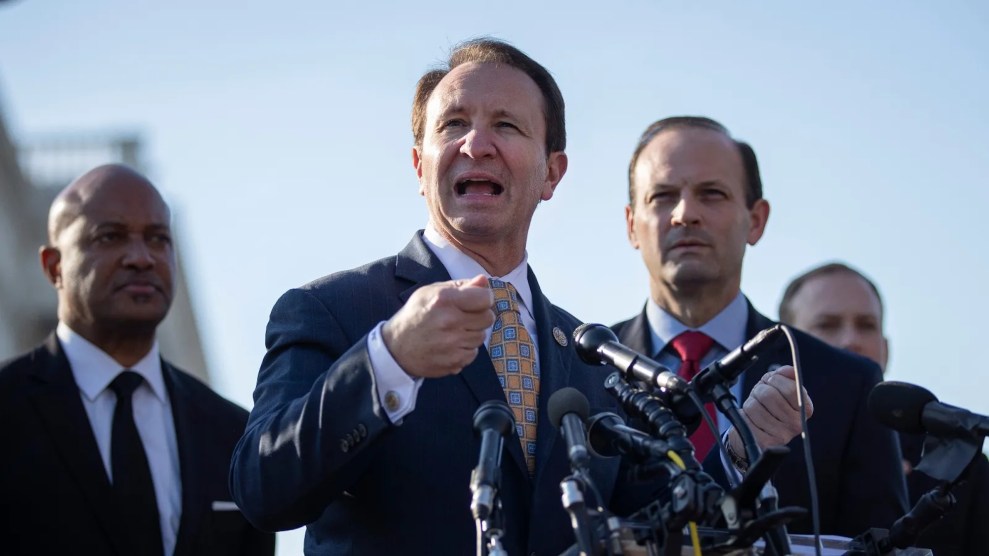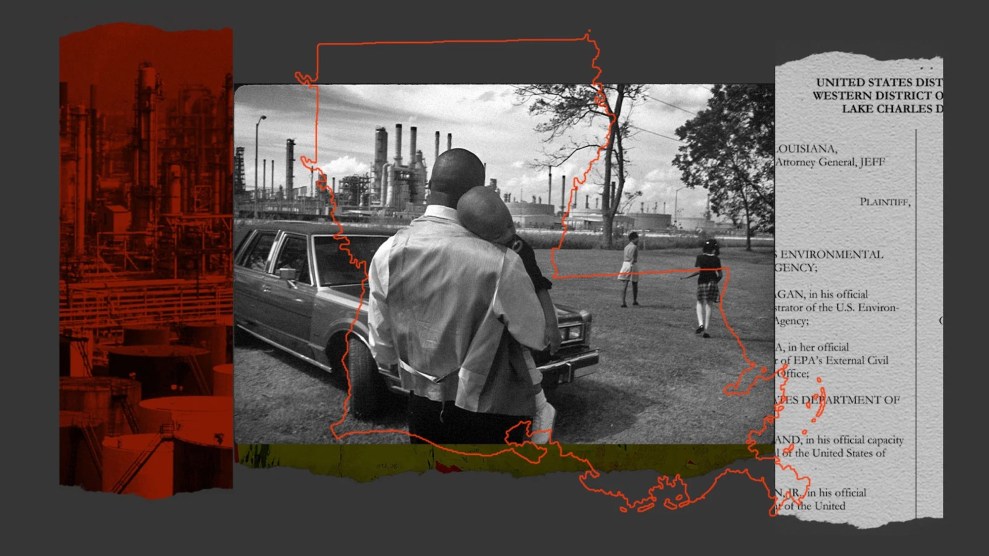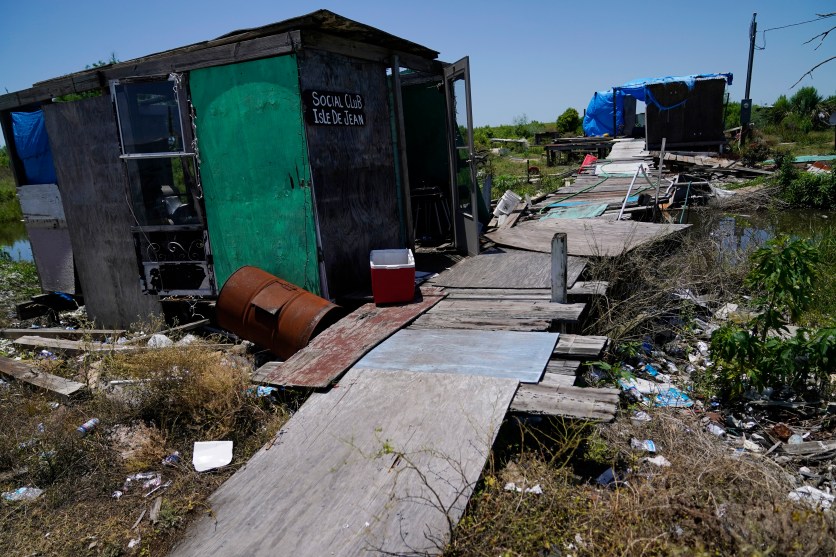
Drew Angerer/Getty Images/Grist
This story was originally published by Grist and is reproduced here as part of the Climate Desk collaboration.
Climate change looms larger in Louisiana than it does almost anywhere else in the United States. The state is facing down monster hurricanes as well as sea-level rise, and it still relies on a fossil fuel industry that pollutes the state’s air and erodes its wetlands.
But the state’s incoming governor, Republican Jeff Landry, doesn’t see it that way. Landry, who has served as Louisiana’s attorney general for almost eight years, is one of the most stalwart opponents of President Joe Biden’s climate policies, and he won election this fall after calling climate change a “hoax” and defending polluters.
He earned an outright majority of votes in the first round of the gubernatorial election last month, surprising many observers who thought the race would head to a second-round runoff. He will succeed the term-limited Democrat John Bel Edwards, whose commitment to climate action made Louisiana an outlier along the Gulf Coast. With a Republican-controlled legislature backing him, Landry could tug the state in a stark new direction, unwinding Edwards’ plans and bolstering support for industries with a long record of environmental issues.
Landry has made a national name for himself as Louisiana’s attorney general through aggressive litigation against the Biden administration, leading several lawsuits against Biden policies on everything from offshore oil lease sales to flood insurance to the cancellation of the Keystone XL pipeline. His most aggressive fight has been against the Environmental Protection Agency, which has been trying to address air pollution in the state’s oil and gas industry.
The latter years of Landry’s term as attorney general coincided with a major push by residents in the state’s main industrial corridors to curb the toxic pollution in their backyards. After years of regulatory rollbacks under former President Donald Trump, advocates finally saw an opportunity for systemic change after the 2020 election. During his first week in office, Biden signed an order that created two new executive bodies dedicated to addressing environmental justice, a term that refers to the disproportionate levels of pollution borne by low-income people and communities of color across the country. That same year, a federal judge ordered the EPA to begin responding to the civil rights complaints it receives, a responsibility that the agency had long ignored.
Encouraged by these developments, advocates filed two civil rights complaints against Louisiana regulators for their failure to reduce dangerous emissions in “Cancer Alley,” an 85-mile industrial corridor between Baton Rouge and New Orleans where more than 150 industrial facilities spew cancer-causing chemicals into the air of predominantly Black communities. A 2019 investigation found that many residents of the region inhale air that is orders of magnitude more toxic than the EPA’s safety standards. The EPA opened an investigation into these conditions in April 2022, and then brought together state officials, residents, and advocates to reach an agreement on how best to protect people living in the vicinity of the region’s hulking chemical plants.
Documents obtained by Grist revealed significant progress at the negotiating table, but last spring things began to sour, and Landry may have been the reason why. Adam Kron, an attorney at Earthjustice who worked on the case, told Grist that the breakdown in talks coincided with Landry’s sudden attendance in the negotiation meetings. Then, in June, Landry sued the federal government, arguing that the proceedings represented a vast overstep of the EPA’s authorities. The case could have implications beyond the EPA’s handling of the Cancer Alley complaints: Landry’s legal argument took aim at the agency’s ability to enforce Title VI of the Civil Rights Act of 1964, which states that no person should, on the basis of race, color, or national origin, be subject to discrimination under any program that receives federal funding.
By challenging state regulators’ permitting of plants in majority-Black areas, Landry wrote, EPA officials were “moonlight[ing] as social justice warriors fixated on race.” In a twist, he accused federal officials of being discriminatory, arguing that their actions implied that chemical plants should be concentrated in other, whiter areas. Shortly after Landry filed suit, the EPA dropped both civil rights complaints in Louisiana, dealing a major blow to Cancer Alley residents who had fought for years to overhaul the state’s permitting and regulation of big polluters.
Kron said that the case clearly laid out the governor-elect’s vision for addressing civil rights concerns in communities facing disproportionate exposure to toxic emissions. “As attorney general with no direct authority over [state regulators] he managed to work these agreements, and now he’ll be the one with direct control over those agencies,” he said. “It really doesn’t bode well.”
Landry has also challenged the Biden administration’s efforts to adapt to worsening climate disasters. Earlier this summer, he sued the Federal Emergency Management Agency over its new flood insurance pricing system, which has resulted in higher insurance premiums for many homeowners in coastal states such as Louisiana and Florida. Experts agree that flood insurance prices under the old system didn’t reflect rising flood risks, but Landry and several other Republican state attorneys general argued that the federal government had exceeded its authority when it raised insurance premiums.
In addition, Landry and the American Petroleum Institute, an industry group, sued the Biden administration in August in an attempt to force the administration to hold larger oil lease sales in the Gulf of Mexico. He also led Republican states in a lawsuit against the Biden administration over its attempts to set a new standard for the “social cost of carbon,” a key metric for setting climate policy. The conservative-led Supreme Court sided with the administration in 2022 and again last month.
An attorney and former sheriff’s deputy who hails from the state’s central coast, Landry has always been an ardent supporter of the oil industry. He majored in environmental science at the University of Louisiana-Lafayette and started what his campaign calls an “oil and gas environmental service company” after graduating, then went to law school before winning a single term in Congress during the “red wave” election of 2010.
In 2011, the year after the BP oil spill, Landry pushed the Interior Department to restart drilling permits in the Gulf of Mexico and compared department employees to the Nazi Gestapo when they refused to meet with him on short notice. The same year, when then-President Barack Obama gave a speech to Congress announcing his jobs plan, Landry held up a sign that read, “Drilling = Jobs.” As attorney general, he served on the board of his top political ally’s oil services company, raising ethics allegations.
Louisiana’s outgoing governor, Edwards, also supported the oil industry, and has even feuded with the Biden administration over its attempts to limit new oil drilling, but he has paired that support with action on climate change. Louisiana’s climate action plan, which an Edwards-appointed council approved last year, calls for the state to halve emissions from 2005 levels by the end of the decade, the same as Biden’s national target.
In response to Landry’s gubernatorial victory, the Louisiana Oil and Gas Association, an industry trade group, called Landry a “friend of industry” and speculated that he will continue to support the development of liquefied natural gas export terminals in the southernmost parts of the state. In 2017, Landry worked with a Houston-based businessman to import more than 300 Mexican laborers to help construct a massive new liquefaction facility in Cameron Parish, Louisiana. According to the Times-Picayune, the venture involved two firms owned by Landry, and a third owned by his brother.
Landry has called climate change a “hoax,” arguing that the Earth’s temperature has risen and fallen in cycles “repeated long before civilization of man.” He has also criticized renewable energy, arguing that the Biden administration’s focus on solar and wind is an attempt to force Louisiana into “energy poverty” and that “the DC swamp must face the fact that the manufacturing of wind turbines and solar panels requires natural gas, crude oil, and coal.” The political organization Climate Cabinet expects Landry to rescind Edwards’ climate plan upon taking office. Neither Landry’s state office nor his campaign responded to Grist’s request for comment.
Even so, there may be one area where the outgoing and incoming governors have common ground. During his two terms as governor, Edwards helped implement a $50 billion coastal restoration program that will leverage money from a BP oil spill settlement to protect the state’s coastline from further erosion. These coastal restoration efforts enjoy broad support from Louisiana voters in both parties, and even politicians who oppose climate action have touted levees and marsh-creation projects in their towns. During his time as attorney general, Landry endorsed a settlement deal with the mining and oil company Freeport-McMoRan that would see the company spend $100 million on this kind of erosion control, despite industry objections.
Kimberly Davis Reyher, the executive director of the Coalition to Restore Coastal Louisiana, a nonprofit advocacy group, says she’s hopeful that Landry will maintain investments in coastal restoration even if he unwinds other climate and environmental protections.
Coastal erosion is “not a partisan issue here, so you don’t have to argue about climate change,” she told Grist. “You just go down to the coast and observe the water going up and the land going down.” She added that the Edwards administration succeeded in building a bipartisan consensus around coastal restoration issues and said she’s “hopeful” that Landry will look for ways to supplement the BP erosion funding, perhaps by trying to get a larger share of lease revenue from oil and gas companies.
When it comes to other climate and environmental issues, though, she’s far less optimistic about a Landry governorship. “We’ll see what happens,” she said.

















